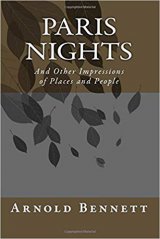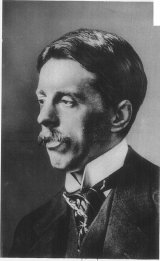Paris Nights and Other Impressions of Places and People Page #6
Enoch Arnold Bennett (27 May 1867 - 27 March 1931) was an English writer. He is best known as a novelist, but he also worked in other fields such as the theatre, journalism, propaganda and films. Bennett was born in a modest house in Hanley in the Potteries district of Staffordshire. Hanley was one of the Six Towns that were joined together at the beginning of the 20th century as Stoke-on-Trent and are depicted as "the Five Towns" in some of Bennett's novels. Enoch Bennett, his father, qualified as a solicitor in 1876, and the family moved to a larger house between Hanley and Burslem.
- Year:
- 1913
- 108,230 Views
I wanted to dine, and there were a thousand restaurants within a mile; but they had all ceased to invite me. I was beaten down by the overwhelming sadness of one who for the time being has no definite arranged claim to any friendly attention in a huge city--crowded with pre-occupied human beings. I might have been George Gissing. I re-wrote all his novels for him in an instant. I persisted southwards. The tiny walled river, reflecting with industrious precision all its lights, had no attraction. The quays, where all the book shops were closed and all the bookstalls locked down, and where there was never a café, were as inhospitable and chill as Riga. Mist seemed to heave over the river, and the pavements were oozing damp. I went up an entry and rang a bell, thinking to myself: “If he isn’t in, I am done for!” But at the same moment I caught the sound of a violoncello, and I knew I was saved, and by a miracle Paris was herself again. ***** “Not engaged for dinner, are you?” I asked, as soon as I was in the studio. “No. I was just thinking of going out.” “Well, let’s go, then.” “I was scraping some bits of Gluck.” The studio was fairly large, but it was bare, unkempt, dirty, and comfortless. Except an old sofa, two hard imperfect chairs, and an untrustworthy table, it had no furniture. Of course, it was littered with the apparatus of painting. Its sole ornamentation was pictures, and the pictures were very fine, for they were the painter’s own. He and his pictures are well known among the painters of Europe and America. Successful artistically, and with an adequate private income, he was a full member of the Champ de Mars Salon, and he sold his pictures upon occasion to Governments. Although a British subject, he had spent nearly all his life in Paris; he knew the streets and resorts of Paris like a Frenchman; he spoke French like a Frenchman. I never heard of him going to England. I never heard him express a desire to go to England. His age was perhaps fifty, and I dare say that he had lived in that studio for a quarter of a century, with his violoncello. It was plain, as he stood there, well dressed, and with a vivacious and yet dreamy eye, that the zest of life had not waned in him. He was a man who, now as much as ever, took his pleasure in seeing and painting beautiful, suave, harmonious things. And yet he stood there unapologetic amid that ugly and narrow discomfort, with the sheet of music pinned carelessly to an easel, and lighted by a small ill-regulated lamp with a truncated, dirty chimney--sole illumination of the chamber! His vivacious and dreamy eye simply did not see all that, never had seen it, never saw anything that it did not care to see. Nobody ever heard him multiply words about a bad picture, for example,--he would ignore it. With a gesture of habit that must have taken years to acquire he took a common rose-coloured packet of caporal cigarettes from the table by the lamp and offered it to me, pushing one of the cigarettes out beyond its fellows from behind; you knew that he was always handling cigarettes. “It’s not really arranged for ’cello,” he murmured, gazing at the music, which was an air from Alceste, arranged for violin. “You see it’s in the treble clef.” “I wish you’d play it,” I said. He sat down and played it, because he was interested in it. With his greying hair and his fashionable grey suit, and his oldest friend, the brown ’cello, gleaming between his knees, he was the centre of a small region of light in the gloomy studio, and the sound of the ’cello filled the studio. He had no home; but if he had had a home this would have been his home, and this his home-life. As a private individual, as distinguished from a public artist, this was what he had arrived at. He had secured this refuge, and invented this relaxation, in the middle of Paris. By their aid he could defy Paris. There was something wistful about the scene, but it was also impressive, at any rate to me, who am otherwise constituted. He was an exile in the city of exiles; a characteristic item in it, though of a variety exceedingly rare. But he would have been equally an exile in any other city. He had no consciousness of being an exile, of being homeless. He was above patriotisms and homes. Why, when he wanted even a book he only borrowed it! “Well, shall we go out and eat?” I suggested, after listening to several lovely airs. “Yes,” he said, “I was just going. I don’t think you’ve seen my last etching. Care to?” I did care to see it, but I also desired my dinner. “This is a pretty good print, but I shall get better,” he said, holding the sheet of paper under the lamp. “How many shall you print?” I asked. “Thirty.” “You might put me down for one.” “All right. I think it will give you pleasure,” he said with impartial and dignified conviction. After another ten minutes, we were put on the quay. “Grand autumn night?” he said appreciatively. “Where shall we have the apéritif? “Apéritif! It’s after eight o’clock, man!” “I think we shall have time for an apéritif” he insisted, mildly shocked. Drawing-rooms have their ritual. His life, too, had its ritual. ***** At nearly midnight we were sitting, three of us, in a café of the Montparnasse quarter, possibly the principal café of the Montparnasse quarter. Neither notorious nor secretly eccentric; but an honest café, in the sense of “honest” applied to certain women. Being situated close to a large railway terminus, it had a broad and an indulgent attitude towards life. It would have received a frivolous habitué of the Place Blanche, or a nun, or a clergyman, with the same placidity. And although the district was modified, and whole streets, indeed, de-Parisianised by wandering cohorts of American and English art-amateurs of both sexes, this café remained, while accepting them, characteristically French. The cohorts thought they were seeing French life when they entered it; and they in fact were. This café was the chief club of the district, with a multitudinous and regular clientèle of billiard-players, card-players, draught-players, newspapers readers, chatterers, and simple imbibers of bock. Its doors were continually a-swing, and one or the other of the two high-enthroned caissières was continually lifting her watchful head from the desk to observe who entered. Its interior seemed to penetrate indefinitely into the hinterland of the street, and the effect of unendingness was intensified by means of mirrors, which reflected the shirt-sleeved arms and the cues of a score of billiard-players. Everywhere the same lively and expressive and never ungraceful gestures, between the marble table-tops below and the light-studded ceiling above! Everywhere the same murmur of confusing pleasant voices broken by the loud chant of waiters intoning orders at the service-bar, and by the setting down of heavy glass mugs and saucers upon marble! Over the café, unperceived, unthought of, were the six storeys of a large house comprising perhaps twenty-five separate and complete homes.
Translation
Translate and read this book in other languages:
Select another language:
- - Select -
- 简体中文 (Chinese - Simplified)
- 繁體中文 (Chinese - Traditional)
- Español (Spanish)
- Esperanto (Esperanto)
- 日本語 (Japanese)
- Português (Portuguese)
- Deutsch (German)
- العربية (Arabic)
- Français (French)
- Русский (Russian)
- ಕನ್ನಡ (Kannada)
- 한국어 (Korean)
- עברית (Hebrew)
- Gaeilge (Irish)
- Українська (Ukrainian)
- اردو (Urdu)
- Magyar (Hungarian)
- मानक हिन्दी (Hindi)
- Indonesia (Indonesian)
- Italiano (Italian)
- தமிழ் (Tamil)
- Türkçe (Turkish)
- తెలుగు (Telugu)
- ภาษาไทย (Thai)
- Tiếng Việt (Vietnamese)
- Čeština (Czech)
- Polski (Polish)
- Bahasa Indonesia (Indonesian)
- Românește (Romanian)
- Nederlands (Dutch)
- Ελληνικά (Greek)
- Latinum (Latin)
- Svenska (Swedish)
- Dansk (Danish)
- Suomi (Finnish)
- فارسی (Persian)
- ייִדיש (Yiddish)
- հայերեն (Armenian)
- Norsk (Norwegian)
- English (English)
Citation
Use the citation below to add this book to your bibliography:
Style:MLAChicagoAPA
"Paris Nights and Other Impressions of Places and People Books." Literature.com. STANDS4 LLC, 2025. Web. 12 Mar. 2025. <https://www.literature.com/book/paris_nights_and_other_impressions_of_places_and_people_110>.








Discuss this Paris Nights and Other Impressions of Places and People book with the community:
Report Comment
We're doing our best to make sure our content is useful, accurate and safe.
If by any chance you spot an inappropriate comment while navigating through our website please use this form to let us know, and we'll take care of it shortly.
Attachment
You need to be logged in to favorite.
Log In